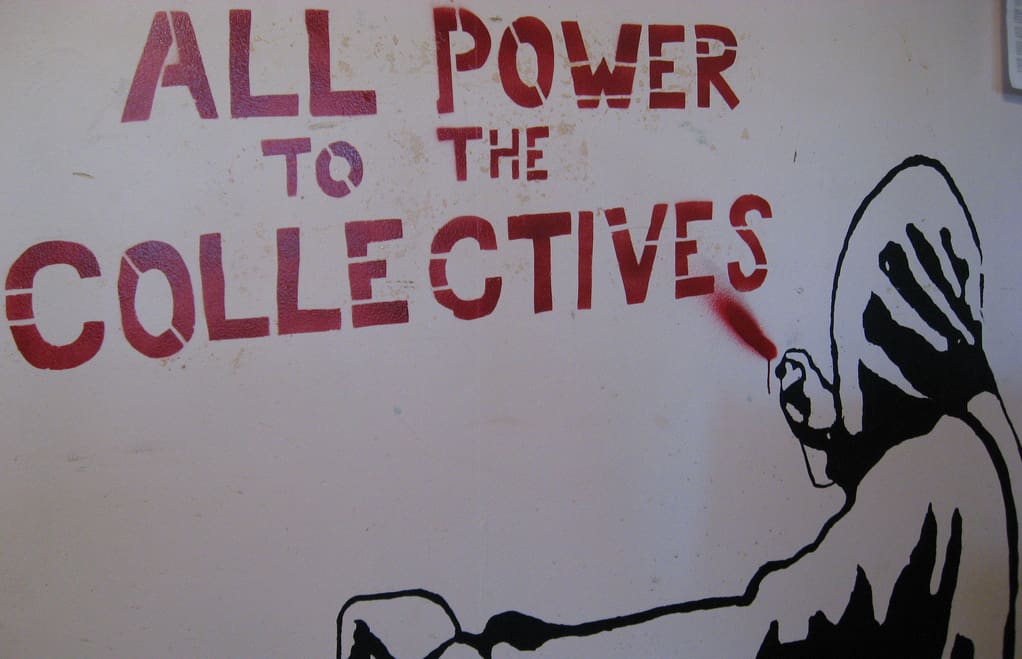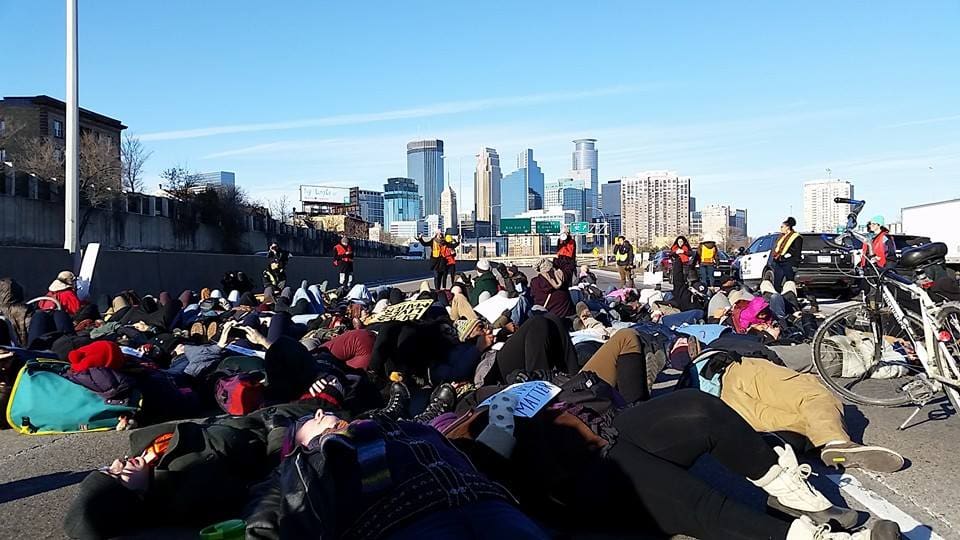Transcribed from the 10 March 2018 episode of This is Hell! Radio (Chicago) and printed with permission. Edited for space and readability. Listen to the whole interview:
The theory of individualism within neoliberalism is not about abstract rights or even having property. It’s that you are human capital that has to compete and must constantly be self-appreciating. The self is capital that must be appreciated. That is a profound shift in political philosophy.
Chuck Mertz: Neoliberalism is causing an epidemic of anxiety. It seeps into every part of our lives, constantly pitting us against each other, forcing us to see everybody as a source of competition, and doing everything it can to kill cooperation, leaving us alone to fend for ourselves. Yes, it is that bad. But there still may be a way out. Here to tell us all we need to know about neoliberalism and what we still may be able to do about it, Julie A. Wilson is author of Neoliberalism, which is part of the Key Ideas in Media and Cultural Studies series being published by Routledge. Other titles and topics in the series include Cultural Policy, Reality TV, Culture, and Representation.
Welcome to This is Hell!, Julie.
Julie A. Wilson: Thank you for having me.
CM: It’s great to have you on the show.
You write, “Within academia, neoliberalism is a controversial term. Scholars continue to debate its usefulness. On the one hand, for some it is a buzzword, a catchphrase: it is a term that is so often repeated and invoked that it has lost its meaning. According to these critiques, neoliberalism is presented as a scary monster that is everywhere and nowhere all at once. It has come to figure as shorthand for everything that is evil in our world, and as a result it ends up teaching us very little about what specifically is wrong, how exactly we got there, and what actually can be done to change course.
“On the other hand,” you point out, “other scholars prefer not to use the term because they argue that it is misleading. Neoliberalism is simply an advanced form of liberal capitalism; there’s nothing really new or neo- here, so why overstate and confuse things with a prefix?”
Is neoliberalism an appropriate word to use? Isn’t neoliberalism simply capitalism or privatization and nothing more or less? What makes it a useful term?
JW: As a professor of media and cultural studies working with young people, I think the term is important to hang on to because it gives us a way to map our conjuncture—the complicated interplay of social, political, and economic forces that shape and make the world as it is.
We all know we live in a global, complex society. It’s a cliché. What young people are wrestling with is that they know everything is really messed up, and there’s so much information and so many different explanations out there—how do I put it all together and tell a coherent story that not just explains things but that helps form the kind of intellectual and emotional/affective capacities they need to build a new world?
I’m a fan of talking about neoliberalism from a critical perspective with young people. I have to say, though, when I wrote my dissertation back in graduate school, I didn’t use the word, even though I could have. I just felt like everyone talks about neoliberalism. It wasn’t until the context of teaching that I really started to think about what it could do for our radical imaginations.
Cultural studies scholars are really interested in helping students think about their everyday lives and why they feel the way they do. What are the larger forces that are shaping those feelings? I believe in and was inspired to go into education by critical pedagogy—and was always really committed to meeting students where they’re at. Neoliberalism really does help name and define what they’re feeling and what they already know. It helps them put a story to it in ways that other folks who have lived through the civil rights movement or other historical moments might not find as useful.
My students right now barely remember 9/11 at this point. The first-years coming into my classes grew up mostly in a post-2008 context. With discussions of neoliberalism, I try to help them get their head around their conjuncture—the moment they’re in and the challenges they’re facing.
CM: What happens when we are all in competition with each other and everything else, including ourselves? How does that change the way we view ourselves, our families, our neighbors, our friends, and our world?
JW: Before writing this book and the research I did, I hadn’t really understood that we’re not just talking about market competition, but a sense of competition in everyday life that structures how we’re oriented to the world and to other people. Also, what are the broader political stories that we tell, and how do we see our role in them? Even though young people might know at a certain level that they want to have these deep relationships—they know that the world is messed up and they want to change it—they feel incredibly disciplined by the ways in which they have to be competing human capital and they have to take “personal responsibility” for their futures. A lot of them are taking on significant amounts of debt; that in itself is disciplining too.
This has all kinds of consequences for their everyday lives. They find it incredibly hard to trust other people or work together; even if they don’t want to, they constantly have to be a brand and be working on this brand; and they feel like they’re failing all the time, because their whole lives are built around an impossibility—personal responsibility. The idea that we can self-appreciate our way to success is impossible, and of course failure is always imminent.
For me, though, the biggest impetus to write the book was to explore how that sense of competition and disconnection from other people—and that lack of trust, the lack of willingness to take a risk or to imagine something else might be possible—seeps into our political imaginations as well. There are so many ways that competition has become the deep structure of our politics, and it feels like there’s no way to get out of that sense that there really is No Alternative, as Margaret Thatcher said, to capitalism or “meritocracy” or market-based solutions.
CM: You write, “Neoliberalism has profoundly transformed the fabric of identity and social life.” How does neoliberalism reinvent the belief in individual liberties, property rights, free markets? How does neoliberalism change the liberalism that the US was founded upon?
JW: One of the things that fascinated me in delving deeper into neoliberalism was this shift in the ideology towards individualism. Within earlier forms of liberalism, the idea of the individual was rooted in property and abstract individual rights. These are prescribed in the constitution and the declaration of independence—all these things founded the state and capitalism here and undergird them. In neoliberalism, though, the state’s role shifts from thinking of itself as a territory with a population that it is taking care of to a promoter of global competition, where the state is no longer interested in taking care of the population and maximizing the wealth of individuals and nurturing rights.
You can’t make competition and personal responsibility the basis for society. There are just too many things that we need to do together for the common good.
The theory of individualism within neoliberalism is not about abstract rights or even having property. It’s that you are human capital that has to compete and must constantly be self-appreciating. The self is capital that must be appreciated. That is a profound shift in political philosophy and our theories about what it means to be an individual, and it comes from neoliberal philosophers like Hayek.
CM: What impact do you think the sense of perpetual competition can have on the family? Do you think there’s any contradiction among those who support neoliberalism and what people may define as “family values”? Is neoliberalism in contradiction with family values?
JW: That’s an insightful question. For another book, I spent a lot of time talking to women with young children about their everyday lives within the digital culture and all the work that they do to try to keep family together. We don’t talk about it very much, but neoliberalism advances on the backs of women’s labor. When we roll back public support for schools and for all kinds of social infrastructure that we need to carry on life, that really relies on the family to pick up the slack. And because of the gendered division of labor that we have and the way that caring work is still naturalized to women and exploited in various ways, it is women who end up stepping in and providing the glue to hold society together.
Neoliberalism is profoundly contradictory especially for women, because on the one hand it basically says we are in a post-feminist era, women can be a brand and can be whatever they want, and neoliberalism welcomes this diverse, post-feminist world where women can do anything and you can choose to have a family or not—but on the other hand it continues to rely on their labor.
If you’re a social conservative and you’re speaking about family values, that might be compatible with neoliberalism within a more rightwing neoliberal sensibility based on more conservative or traditional social hierarchies of gender and race and nationality. But a more “left” neoliberalism still exploits women’s labor and relies on it, but speaks in much more “empowering” and marketized equality rhetoric.
CM: If competition leads to innovation, how does neoliberalism’s embrace of competition undermine our political imagination? Can competition lead to technological innovation while killing social and political imagination?
JW: Absolutely. There is always the question, “But isn’t competition good?” or “Isn’t innovation good?” Maybe, but you can’t make competition and personal responsibility the basis for society. There are just too many things that we need to do together for the common good. Hayek talks about the market as the “site of truth,” and how the spontaneous order and solutions that suit people’s needs will genuinely be worked out in the market. This is a huge myth, but it is the rationale for hollowing out public and democratic institutions as well as our own capacity and desire to participate in them.
What I want my students to do is to innovate at the level of political imagination. In order to do that, they’re going to have to get outside a market paradigm. Neoliberalism and competition have created this sense that the only way to move forward is through the market. Markets might very well have a role to play in a future egalitarian and just society that works for all, but to put it crudely, when a society is organized around profits versus people, that’s when you run into social misery, inequality, and all the things that neoliberalism gives us.
And frankly, what’s at stake is the planet and everything living on it. Climate change requires global cooperation. As Naomi Klein has said, addressing climate change is not compatible with maintaining neoliberal capitalism. What neoliberalism tells us, as self-enclosed individuals who are looking to self-appreciate within the market, is that we might have a role to play in combating climate change by buying green products or expressing our views on social media about how wrong climate change is, but that’s ultimately not going to do much about the problem. It’s a market-based response: we buy better products, we express outrage that is then quantified and used to sell us better messages on social media. But it’s not a practice of collective governance. To fight climate change, we need a global process of cooperation and governance. It seems increasingly impossible even to imagine what that could look like.
CM: You write, “We move through the world with an oppositional consciousness where all things are potential threats to our own individual self.” How much does neoliberalism lead to fear?
JW: Even more than fear, which is a definite byproduct of this, at the level of every day life it’s more about the sensibility of threat that at any moment things could fall apart. It could be violent crime that the media reports on, but it could also be something as small as a car breaking down. As we move through the world, anything could undo everything that we’re trying desperately to hold onto. Everything seems to be held as suspect, everything must be evaluated in terms of risk or threat, and that’s not just paranoid, but it’s completely debilitating in terms of social life.
If we’re all looking at every interaction or invitation or social scenario in terms of that framework of risk management, of potential harm, it makes it difficult to think about things like organizing politically with other people, trusting other people. When I think about oppositional consciousness, it’s not so much that opposition and political antagonism is the problem, because we know that if we’re going to build a better communist world beyond capitalism, we’re going to need to fight like hell for it. But we need to move out of this paradigm of constant fear, threat, and mistrusting of other people and into a world-building one where we remember that there are alternatives, that we are social and historical constructions, that the world isn’t always going to be this way, and it’s a question of how we’re going to show up and what part we’re going to play in organizing for a better future.
But oppositional consciousness is a real stumbling block at the level of minute everyday-life, and prevents us from being—and even desiring to be—in common with other people. I live in a place where you can see crumbing physical infrastructure all the time, every day: divestment and the gutting of local government. Neoliberalism is to blame for that—and it’s a huge thing to organize common ground around. People are working on the ground to make housing safer. We have a huge renter population here, and they’re fighting for physical infrastructure, figuring out how to partner in particular ways to take care of basic material things like roads and bridges.
But they’re also organizing to bring people together across divides—whether we’re talking about race or socioeconomics or culture or religion—and to experiment with what we could do when we come together and do things that are free and fun. That’s a different kind of infrastructure. That’s working on people’s capacities to be together and to want to be together, and not just walk down the street and see someone and think that they’re a threat. No, we can be in this place together and do things collectively.
CM: You write, “When asked to consider various forms of privilege, many of my white male students get defensive. The idea that they haven’t earned their place through their own decisions and hard work but rather benefited from inherited wealth and opportunity means they are not good people from the perspective of neoliberalism.”
To what degree, then, do those who dismiss neoliberalism as a term, dismiss it because they have to some degree benefited from privilege?
New communication tools can certainly be great for organizing, but at the same time they also reinforce neoliberalism, self-enclosed individualism, competition, branding, and all those logics.
JW: Students don’t dismiss neoliberalism when they understand what it means. Those same white male students who get defensive and have trouble speaking about privilege are much more able to think through that and talk about it when there’s some kind of common ground. That’s what teaching about neoliberalism can do. These issues of inequality and exploitation and historical legacies of settler colonialism that we’re still very much living with—we need to take them out of an interpersonal frame, which is where the dominant discourses of privilege and inclusion and diversity (which are governing discourses of neoliberalism) keeps them. When we take it out of that frame and give everyone a common ground, it doesn’t mean you’re all the same, but students are much more eager, willing, and able to engage.
Because of the way our curriculum is set up, I end up teaching and working with a lot of economics students, who are by far the most conservative students on campus. I used to be kind of scared. But they engage. That’s one of the reasons I wrote the book. Talking about this can allow us to have conversations that get away from the competition and self-enclosed individualism in which certain people clearly have way more privilege and not a lot to lose, and into a place where students are working together across differences and are okay with those differences and are willing to acknowledge histories and their own positions, because they’re seeing it within this larger frame that they all understand and share.
CM: How far would recognizing that everyone suffers from the same anxiety go towards challenging the system that makes us anxious?
JW: It is one of those shared, common experiences that has the potential to bring people into relation with one another and create a shared sense of what’s wrong and what kind of world we would want to live in. The tricky part comes from the fact that that can’t erase all the very real differences and histories at the same time. But anxiety and depression and also just how unhealthy we are and how bad everyone feels—whether they have a diagnosis for it or not—is potentially very fertile ground for organizing and for seeing connections and for having young people think about how anxiety is not their fault: “It’s not coming from me; it’s coming from the world.” Why is that? And what would a world look like that is designed to produce a different kind of feeling of being in it?
I find that to be a very productive conversation to have with young people, for sure. It gets their imaginations going.
CM: Is the first step towards challenging neoliberalism the realization that its power over our lives is tenuous? If it’s so tenuous, as you write it is—so weak, so insubstantial—then why haven’t we unclenched the grip it has on our lives?
JW: There are a lot of reasons for that. Though it’s tenuous, it’s everywhere. And we hate it. But we hate it for being everywhere and hate it for being tenuous at the same time. There is a lot of evidence to suggest that neoliberalism is on its last legs. Young people are ready for socialism. They are open and they are starting to organize more and more. There is also what’s happening on the ground in communities (and has been for decades) in places where people are building new economic systems, worker coops. It’s going to be a process.
One of the hardest and thorniest issues, though, is the increasing mediation of everyday life, the rise of social networks, and the power of algorithms and Big Data to shape the environment that we work in. New communication tools can certainly be great for organizing, but at the same time they also reinforce neoliberalism and self-enclosed individualism and competition and branding and all those logics. I’m a media scholar, and I study it, and I don’t like it when people say, “Oh, just get off social media and stop watching TV, everything will be okay.” But that is one of our biggest challenges, because it is so embedded in our everyday lives. Digital and media infrastructures are neoliberal machines, for the most part.
CM: Where do you see what you call “the fissures and faultlines where resistance and transformation of neoliberalism are in fact possible”? Because you also write, “There is no pure ‘outside’ to get to or work from. That’s just the nature of neoliberalism’s totalizing cultural power. But let’s not forget that neoliberalism’s totalizing cultural power is also a source of its weakness.”
How is neoliberalism’s totalizing cultural power also a source of its weakness? And where do you see these fissures and faultlines where we can challenge neoliberalism?
JW: If you privatize everything, and you get rid of and destroy the kinds of infrastrucures that make people’s lives possible—if you take that away, people are (out of necessity) going to come together and figure things out. It seems to me that neoliberalism is constantly sowing the seeds of its own demise by the fact that it doesn’t take care of basic common infrastructures, whether those are psychological, like our mental health, or whether it’s our communities and the basic things that we need to live. That’s where the fissures and faultlines are.
I talk about the idea of disaffected consent: people acquiesce to neoliberalism, but they’re completely disaffected from it. They don’t like it. They’re disciplined into it by debts and by the norm of competition and the social darwinism that it promotes. But disaffected consent is a pretty tenuous thing to build a society on. The possibility for organizing is tremendous. In a lot of ways, we’ve never had as much in common as we do right now. Being able to let go of this self-enclosed individualism could unleash a broad socialist project.
We’re already seeing that with the rise of worker cooperatives—what’s going on in Jackson, Mississippi right now with Cooperation Jackson is amazing, and that’s just one community. We see it all over the Rust Belt, too, in places that are not media capitals so they’re not getting talked about. But on the ground, people are exploiting those faultlines within neoliberalism. We’ve got the new story figured out, and it doesn’t have a name yet, but I think that’s where we’re heading.
CM: What you hope for is that everybody sees that they have a life in common, that we share common lives. But is there such a thing as a “common good”? Isn’t what I think is good for me not necessarily what is good for everybody?
JW: What we need is to move from living in competition to living in common, and that means that at a psychological or affective level, we have to find ways to spark a desire for being with other people and not being self-enclosed individuals. That means being with people who might seem threatening or are different, or people who seemingly don’t “add value,” in order to find something in common.
But the other part is that we have to build a political and economic system that is premised on the egalitarian production and sharing of wealth. Neoliberalism can look very progressive when it speaks about diversity and meritocracy, but ultimately, if we want a common society, we need to be thinking about equal outcomes. We all have a part to play and we all have the right to participate in redefining and building the world and appropriating the wealth that we can all produce together, equally.
CM: Julie, I really appreciate you being on our show. Thank you so much.
JW: Thank you so much for having me.





